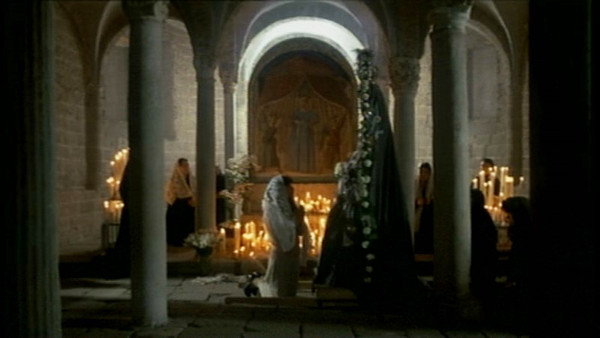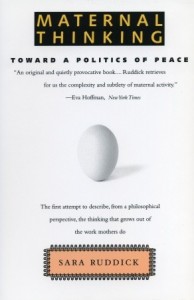
The feminist Sara Ruddick must be doing something right if both Alasdair MacIntyre and Janet Martin Soskice cite her as an influence. MacIntyre credits the feminist philosopher’s work in the field of disability studies at the start of Dependent Rational Animals. Soskice borrows Ruddick’s phenomenology of the parental gaze in Maternal Thinking for her writings on parenting and spirituality in The Kindness of God.
Here Soskice adopts Ruddick’s phenomenology of the parent’s gaze in order to make an analogy with the classical experience of mystical letting go:
The parents–or those who attend in love–undergo changes as well. The biological reciprocity between mother and child in early infancy is continued in innumerable small acts of watchfulness, many almost as involuntary as lactation: for instance, the scanning, native to parents of toddlers, of any new surroundings for steep steps, sharp, breakable, or swallowable objects. Parents do not always think too much about this, they simply do it as a few years further along in the child’s life they will not. Other acts of attentiveness require the disciplined and conscious exercise of humility. To attend to the child properly is also to employ the proper passivity of “letting the other be.” The love of the parent, at the best of times, holds the child up without holding them back, for they must grow, and the parents must in gradual but continuous steps “let” without ceasing to love unstintingly. By such means, the rational and spiritual strangely mixed with the visceral and instinctive, parents, at least once in a while, may be “unselved,” just as we may be “unselved” by the kesterl’s flight. The body then is not just or always the bastion of egocentrism. It may equally be the place of letting go.

Soskice goes even further a couple of paragraphs later by noting further analogies between maternal thinking (basically being a full-time parent, although women have traditionally fulfilled this role, hence the name) and the biblical narrative:
These points are not alien to Christian theology. After all, God is portrayed in the Bible as creating a universe that endures for a time but will end. God is represented as attending to a chosen people involved, at God’s behest, in seemingly ceaseless change. They are called out, established, exiled, freed. God is represented in the Prophetic writings as chivvying them along and unsettling their complacent accommodations. We seem far from Augustine’s tale of the traveler who turns his back on what is material and temporary in order to seek that which is spiritual and eternal; but maybe not. Augustine elsewhere tells another story of a journey, his own journey [with the help of his mother Monica], as recounted in the Confessions.
I wish I had more time to write about this, but I need to let go of blog writing a bit to attend to the girls and my job search. If I had the time I would comment on a Crisis Magazine article about “Sacrificing Religious Life on the Altar or Egalitarianism,” especially since that altar frequently is composed of family life. Maybe some other time? or maybe I will let it go? Yet I wonder, is not sacrifice something good in Christian theology? Maybe our times require a whole new notion of sacrifice, especially with the demographic winter looming sexlessly over later modern societies?
Maybe a maternally oriented spirituality it is much more ancient than we suppose as this divine clip from Tarkovsky’s Nostalghia suggests?
More excerpts from Soskice can be found in a post here. My post on the disintegration of the nuclear family here might also be of interest.











